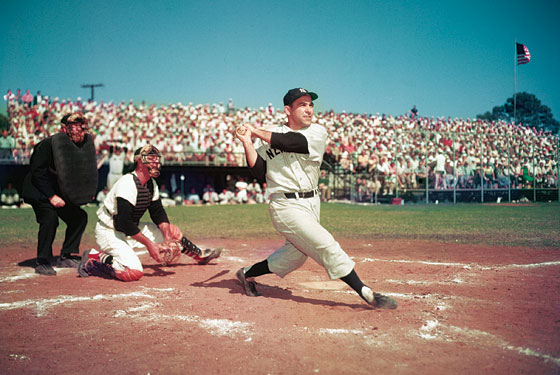 |
Yogi Berra, 1955.
(Photo: Getty Images) |
Will Leitch: The first sport I wanted to bring up was the NFL, which has a disadvantage as opposed to baseball: It didn’t come of age until the TV era. So your main two New York superstars are probably Joe Namath and Lawrence Taylor. And LT was the best player of his time in his position.
Al Leiter: Lawrence Taylor was this guy who transcended his sport. Now, if we’re including what he did off the field, his drugs and his problems, I don’t know if he really is New York
Leitch: Well, New York can often be about those things as well.
Steve Wulf: The thing that strikes me about LT is, not only did he bring linebacking to a whole different level, but that level hasn’t been matched or surpassed.
Joe Sheehan: He’s the end of a line, where he dominated defensively from the linebacker spot. The NFL in the eighties was more balanced than it is today. LT was the last guy who had a claim from the linebacker position to be the best player in the game.
Leitch: Maybe I’m wrong but it seems like now they’re doing the best they can to take the violence out of the game. The first thing we’re thinking about with LT is the Joe Theismann, and his hit on him, the most excruciating, disgusting thing you could ever see on a football field. And we loved him for it. He was a bad guy then, but kind of a likeable bad guy. Now you wonder if he would be on the cover of Sports Illustrated with the cover line What is LT doing to football?
Leiter: They wouldn’t allow it. With Conrad Dobler, I used to watch the Cardinals just to see if he would spit in somebody’s face or rip their helmet off. There was a dirty edge to the game. The money’s too great now--I think they honestly were working for a paycheck. Now they’re protecting paychecks.
Leitch: Joe Namath is the one that started that archetype of the New York athlete, where you have to have swagger, you have to have confidence. Every athlete that’s ever been a leader is always compared to Namath. Sanchez is a Namath; Jeter is a Namath. Do you think that he represents the city, regardless of his merit as a player?
Sheehan: Joe Namath didn’t invent that, Babe Ruth did.
Wulf: When you’re comparing Lawrence Taylor to Joe Namath, I think you’re comparing a great athlete in New York versus a great New York athlete. Are we looking for somebody who embodies New York, or the greatest athlete New York ever had?
Sheehan: I have to tell you, I’m not comfortable with Namath even being discussed next to some of these other guys. With all due respect to one great day in January 1969, he wasn’t a great quarterback. He didn’t have too long a career. If you make a listing of NFL quarterbacks, Joe Namath’s name is gonna come up very deep in the conversation.
Wulf: The one thing I don’t think we should lose sight of is how big that one day was. I mean, it was huge. It was not only a huge day for New York, but it was a huge day for the sport. It changed everything and that’s something we should keep in mind.
Leitch: What do you guys think of John McEnroe? He brought a New York attitude to tennis, a sport that is upper-crust and a bit snobbish. But he brought danger to it.
Sheehan: My memory of tennis was that it was going through a huge boom and I wonder how much of it was these staid personalities giving way to Jimmy Connors, McEnroe. I think you give McEnroe a certain amount of credit for popularizing a sport that had kind of been this country club turn up you nose event and mainstreamed it.
Leitch: Or, if it’s physical toughness you’re talking about, what about Mike Tyson?
Wulf: There was so much excitement when he was coming up. But it turned off so quickly. It left such a negative vibe.
Leiter: The most dominant boxer, definitely.
Sheehan: But when you say New York boxer, I think more of Sugar Ray Robinson or Jake LaMotta.
Leitch: What about a guy like Phil Esposito? At least for personality.
Wulf: Esposito used to have a Japanese Steakhouse on the Upper East Side.
Leiter: Esposito was right in line with the whole Namath thing, kind of a cool cat. Long hair out in the street. McEnroe could be. You had this great cool institution, and then this hothead New Yorker comes on the scene. But what about Arthur Ashe?

